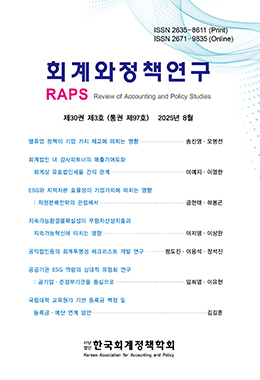[연구목적] 본 연구는 정부 정책 주도로 시행된 기업 밸류업 프로그램이 기업 가치 제고에 미치는 영향을 실증적으로 분석하고, 한국 시장에 대한 정책적 시사점을 도출하는 것을 목적으로 한다. 이를 위해 한국보다 먼저 정책을 도입한 일본 사례를 비교 분석하였다.
[연구방법] 일본은 Nikkei225지수, 한국은 KOSPI200지수에 포함된 상장기업들의 2000년부터 2023년까지의 데이터를 활용하였으며, 일본은 2014년, 한국은 2016년으로 스튜어드십 코드가 도입된 년도를 기준으로 정책 도입 전후를 비교하였다. 패널 GLS(Generalized Least Squares) 회귀분석을 통해 ROE(자기자본이익률), DOE(자기자본배당률), 사외이사비율 등 주요 밸류업 지표의 수준 및 변화가 기업가치 측정 지표(P/B, P/E, EV/EBITDA) 변화에 미치는 영향을 분석하였다.
[연구결과] 분석 결과, 일본의 경우 높은 ROE와 DOE 수준은 기업가치에 긍정적 영향을 미쳤다. 한국의 경우, 평균이상 DOE 수준은 EV/EBITDA에만 긍정적 영향을 주었다. 한국과 일본은 비슷하게 일정 수준의 사외이사비율은 기업 가치 제고라는 질적 효용성으로 직결되지는 않았다. 이는 현재 사외이사 제도의 실효성에 의문을 제기하기 충분하였다.
[정책적 시사점] 본 연구 결과는 정부 주도의 밸류업 프로그램이 실질적인 기업가치 제고로 이어지기 위해서는 밸류에이션 지표 개선을 넘어, 기업 지배구조의 실질적인 변화를 유도하고 장기적인 성장 기반을 마련하는 종합적이고 일관된 정책 추진이 요구된다.
[Purpose] This study empirically examines the impact of the government-led Corporate Value-Up Program on corporate value enhancement in Korea, aiming to derive relevant policy implications for the Korean market. To achieve this, a comparative analysis is conducted with Japan, which implemented similar policies earlier, thereby providing valuable insights into the potential outcomes and challenges of applying such initiatives in the Korean market.
[Methodology] Data from publicly listed companies included in the Nikkei225 index in Japan and the KOSPI200 index in Korea were utilized, spanning the period from 2000 to 2023. The analysis compares the pre- and post-policy periods based on the introduction of the Stewardship Code, which was implemented in Japan in 2014 and in Korea in 2016. A panel data Generalized Least Squares(GLS) regression analysis was conducted to examine the effects of changes in key corporate value-enhancing indicators, such as ROE, DOE, and the proportion of outside directors, on the variations in corporate value measurement indicators(P/B, P/E, EV/EBITDA).
[Findings] The results revealed that in Japan, higher levels of ROE and DOE positively impacted corporate value. In Korea, however, only above-average levels of DOE were found to have a positive influence on EV/EBITDA. Both Korea and Japan showed that a certain threshold of outside director ratio did not result in a qualitative enhancement of corporate value. These findings raise significant concerns regarding the effectiveness of the current system of the outside directors.
[Policy Implications] The findings of this study suggest that for government-led value-up programs to effectively contribute to sustainable corporate value enhancement, improvements in valuation criteria must be complemented by substantial reforms in corporate governance. Furthermore, a coherent and consistent policy framework that fosters long-term growth and addresses structural issues is essential for achieving a lasting impact.




